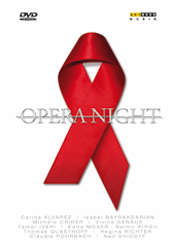The evening is a fund-raiser for the German
AIDS foundation, and after a brief (and strangely awkward) filmed statement in English from
soprano Michèle Crider, the show gets underway with an exciting "Entry of the Guests" from
Tannhäuser, with Marcus Stenz leading the Opera Cologne orchestra and its excellent chorus (all
sporting the familiar red ribbon).
The contribution of the emcee, a "cabaret artist" named Konrad Beikircher, may damage the
enjoyment of some viewers. Clearly reading from notes, with an unmotivated chuckle behind
much of his spiel, the emcee's palaver should have been separately tracked for easy skipping.
Instead, the "fast forward" button will have to be exercised in order to avoid mostly old and
tiresome anecdotes and such gratuitous commentary as an unctuous trashing of the Forza libretto.
Perhaps in his native environment this gentleman puts on quite a show; here, the cameraman
pans the audience anxiously to find the occasional audience member breaking a smile.
The singing, fortunately, makes up for this annoyance. Thomas Quastoff appears first, with a
"Lied an den Abendstern" of rare handsomeness and sensitivity. Much later in the show he comes
back with a delightful rarity, "O sancta justitia" from Lortzing's Zar und Zimmerman. After
Quastoff's Wagner, the show then shifts to bel canto, with young tenor Saimur Pirgu delivering
an able "Una Furtiva Lagrima," his tone only lacking that mysterious charismatic quality that
tenors such as Rolando Villazon and Juan-Diego Florez possess. But Pirgu may yet attain that
status; towards show's end he sings a very sweet "Non ti scordar di me."
Vivica Genaux appears after Pirgu's Donizetti to give a demonstration of impeccable technique
in "Nacqui all'affanno" from Cenerentola, which Isabel Bayrakdarian has to follow. She imparts a
sense of drama into Semiramide's "Bel raggio lusinghier," though she is not in Genaux's class as
a Rossinian. Genaux is just as exciting later with a surprising choice, a zarzuela number about a
tarantula from Jerónimo Giménez.
Upstaging the females in the "hair" department, Carlos Alvarez's wild black lion's mane
impresses just as much as his forceful "Leonore, viens" from La Favorite. The vibrato will either
appeal or come across as a touch too heavy, depending on taste. Tamar Iveri's healthy soprano
may be a touch too strong to deliver a truly tender "Dove sono." Later in the program, however,
she does very well by the exquisite "Chi il bel sogno di Doretta" from Puccini's Rondine. Ms.
Crider, a reliable if unexciting singer, works earnestly through "Pace pace mio Dio." Her
"Summertime" (which also serves as the inexplicable "theme" of the gala) finds her approach
much too overbearing for a lullaby.
Neil Shicoff sings the two big Tosca tenor arias, with distractingly strenuous facial exertions.
The "Recondita armonia" doesn't quite come off, but "E lucevan le stelle" earns him one of the
evening's most lively audience responses. The tenor also seems to have found his way to
Pavarotti's hair colorist.
In the middle of the program Edda Moser and two young singers, Claudia Rohrbach and Regina
Richter, perform the Rosenkavalier trio. Unfortunately, Ms. Moser's experienced (to put it
kindly) voice doesn't blend well with the freshness of the two others. Once again, to put it
kindly.
The last solo appearance has Carlos Alvarez reappear for the rarest of the evening's repertory
choices, "Bless your beautiful hide" from the Gene de Paul score for Seven Brides for Seven
Brothers. Without necessarily forgoing his operatic training, Alvarez imbues the song with easy
masculine charm, making for a delightful performance.
Then most of the singers (Shicoff noticeably absent) trot on to perform "Tonight" from West
Side Story as an ensemble piece. Odd, but enjoyable nonetheless.
The disc also offers as bonus items a speech thankfully cut from the main DVD program, a short
documentary of some of the work the German AIDS foundation has done in South Africa, and a
bizarre trailer for this very gala. All in all, the ratio of fine performances to those less so and
some innovative repertory choices make this one of the better gala DVDs, if one can tolerate the
host.
Chris Mullins
